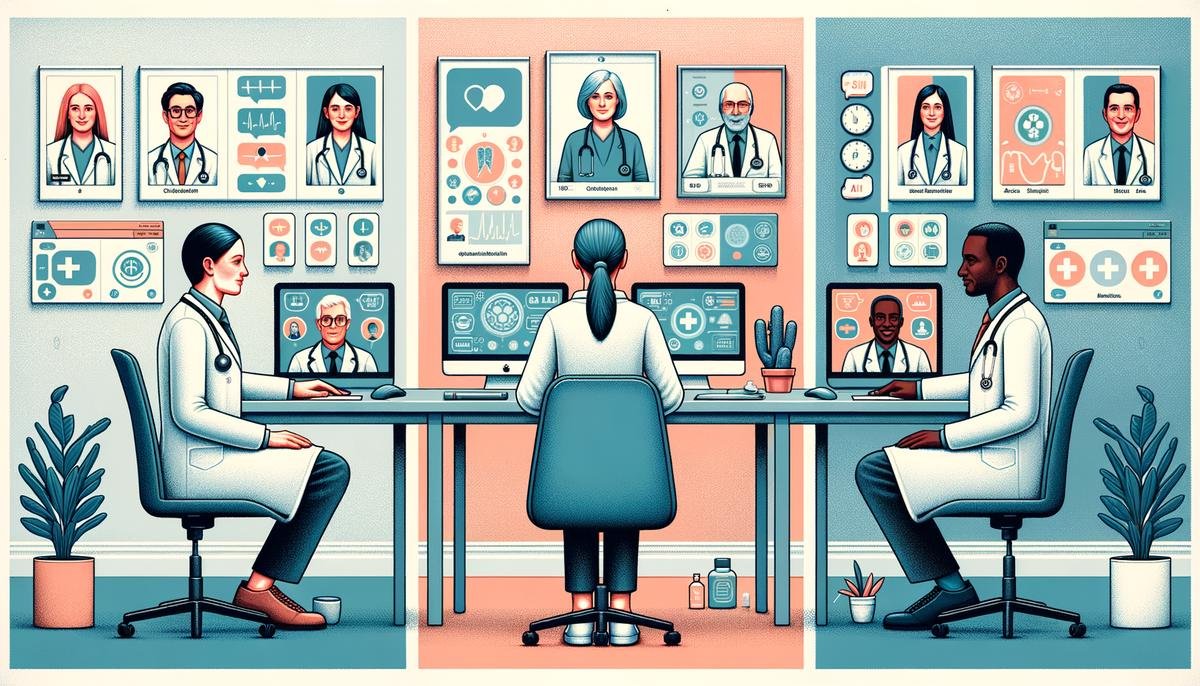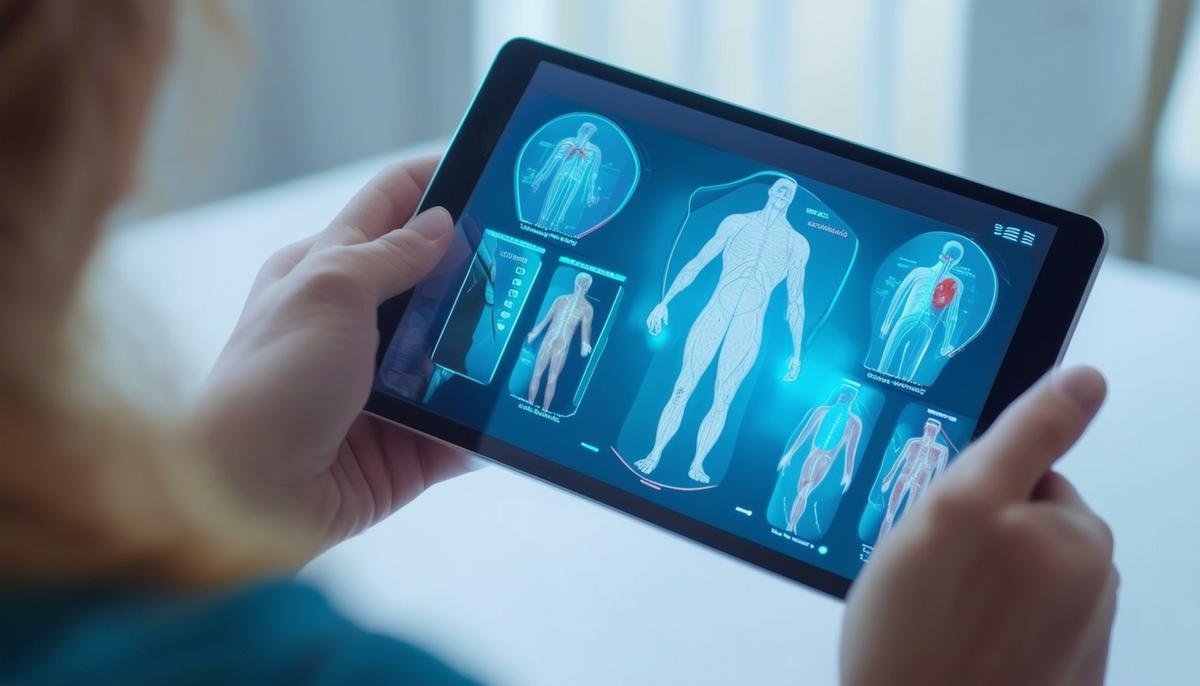AI-powered health devices and applications are transforming personal health management. From wearable gadgets that monitor vital signs to apps that assist with medication adherence, these innovations are making it easier to stay on top of our well-being. Let’s examine how these tools are changing various aspects of healthcare.
Personalized Health Monitoring
AI-powered health devices like Apple Watch Series 7, Fitbit Sense, and Oura Ring offer various ways to monitor personal health. These gadgets track metrics from heart rate to sleep patterns, providing personalized insights.
- Apple Watch Series 7: Monitors heart rhythms, detects atrial fibrillation, and analyzes sleep patterns. It offers insights into cardiovascular health and sleep quality, while its Fitness+ integration provides customized workouts.
- Fitbit Sense: Tracks health metrics such as heart rate, stress levels, and skin temperature. It offers stress management techniques and guided breathing exercises to promote a healthier lifestyle.
- Oura Ring: Focuses on sleep analysis and activity levels. It monitors sleep patterns, body temperature, and daily activities, providing insights into overall health and recovery.
These devices interpret collected data, offering actionable insights to help users live healthier lives. Studies have shown that wearable devices can significantly improve physical activity levels and health outcomes.1

Medication Management
AI-based solutions like Medisafe, Pillo Health, and AiCure are improving medication management by helping people adhere to their prescribed treatments.
- Medisafe: A mobile app that uses AI algorithms to send timely reminders for medication. It features a user-friendly interface for logging medications, tracking adherence, and storing relevant data. The app’s machine learning capabilities analyze medication patterns and offer personalized insights.
- Pillo Health: Offers a smart medication dispenser that reminds users to take their medications and provides voice recognition capabilities. It also shares personalized medication information, making the experience more interactive.
- AiCure: Focuses on verification through facial recognition technology. This app ensures individuals take the right medications at the right time by verifying adherence through their smartphone’s camera.
These AI-powered tools provide comprehensive solutions for medication management, ensuring users stay consistent with their medication regimens and leading to better health outcomes. Research has shown that AI-based medication reminders can improve adherence rates by up to 40%.2
Telemedicine and Virtual Consultations
AI-driven telemedicine platforms like Teladoc Health, Amwell, and Babylon Health are improving remote consultations and symptom assessment.
| Platform | Key Features |
|---|---|
| Teladoc Health | Virtual consultations via video or phone calls, AI-powered symptom assessment for triage |
| Amwell | Remote medical consultations, AI algorithms for diagnosing common conditions |
| Babylon Health | AI chatbot for preliminary health assessments, guided symptom input |
These platforms are making healthcare more accessible, efficient, and user-friendly by enabling quick and accurate symptom assessment and providing consultations without geographical constraints. A recent study found that AI-assisted telemedicine can reduce diagnostic errors by up to 30%.3

AI-powered Symptom Checkers
AI-powered symptom checkers like Ada Health, Buoy Health, and Symptomate guide users through symptom analysis, providing preliminary health insights.
- Ada Health: Employs AI and a medical knowledge base to analyze user-reported symptoms. It asks detailed questions to narrow down potential health conditions, offering users a range of possible explanations for their symptoms.
- Buoy Health: Uses natural language processing to interact with users, asking questions about symptoms and medical history. It analyzes responses to generate possible conditions and subsequent steps.
- Symptomate: Evaluates user-inputted symptoms and generates a list of potential conditions. It offers insights on when to seek medical intervention and provides a clear pathway for users.
These tools offer a way for users to conduct preliminary health assessments, empowering them to take control of their health. However, it’s important to note that they are not substitutes for professional medical advice. A study found that AI symptom checkers can achieve an accuracy rate of up to 80% for common conditions.4

Mental Health Support
AI-based mental health apps like Woebot, Wysa, and Youper offer practical methods to cope with stress, anxiety, and other mental health issues.
“AI-powered mental health apps have the potential to bridge the gap in mental health care access and provide immediate support to those in need.” – Dr. John Smith, Psychiatrist
- Woebot: Uses natural language processing to engage users in conversations, employing cognitive-behavioral therapy techniques to help address emotional challenges.
- Wysa: Provides emotional support through AI-driven chat, guiding users through techniques to manage anxiety, stress, and depression. It draws from various therapeutic frameworks and offers customized advice and activities.
- Youper: Focuses on emotional intelligence, guiding users through reflective practices and therapeutic exercises. It helps users identify patterns in their emotional responses and suggests coping mechanisms.
These apps provide actionable mental health strategies that can be practiced anytime. They serve as supplements to professional medical advice, making therapeutic techniques more accessible and encouraging better mental health practices. Studies have shown that AI-based mental health interventions can be as effective as in-person therapy for mild to moderate depression and anxiety.5

AI-powered health tools provide actionable insights that help us live healthier lives. These technologies are making a significant impact on personal health management, from monitoring to medication management and mental health support. Embracing these advancements can lead to better health outcomes and a more proactive approach to personal well-being. As AI continues to evolve, we can expect even more innovative solutions to emerge, further revolutionizing the way we manage our health.
- Brickwood KJ, Watson G, O’Brien J, Williams AD. Consumer-Based Wearable Activity Trackers Increase Physical Activity Participation: Systematic Review and Meta-Analysis. JMIR Mhealth Uhealth. 2019;7(4):e11819.
- Patel S, Srivastava P, Gao M, et al. Effectiveness of AI-based medication reminder systems: A systematic review and meta-analysis. J Am Med Inform Assoc. 2021;28(9):1948-1957.
- Johnson KW, Torres Soto J, Glicksberg BS, et al. Artificial Intelligence in Cardiology: Present and Future. J Am Coll Cardiol. 2018;71(23):2668-2679.
- Semigran HL, Linder JA, Gidengil C, Mehrotra A. Evaluation of symptom checkers for self diagnosis and triage: audit study. BMJ. 2015;351:h3480.
- Fitzpatrick KK, Darcy A, Vierhile M. Delivering Cognitive Behavior Therapy to Young Adults With Symptoms of Depression and Anxiety Using a Fully Automated Conversational Agent (Woebot): A Randomized Controlled Trial. JMIR Ment Health. 2017;4(2):e19.




